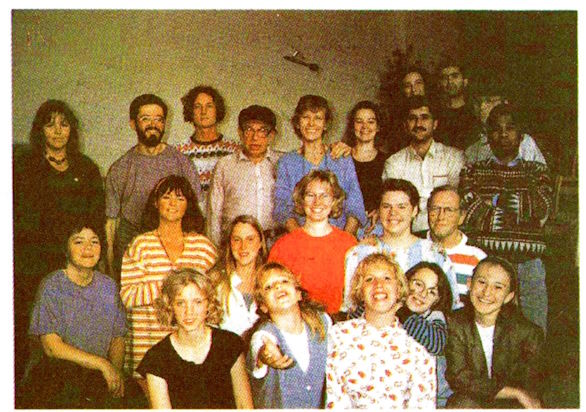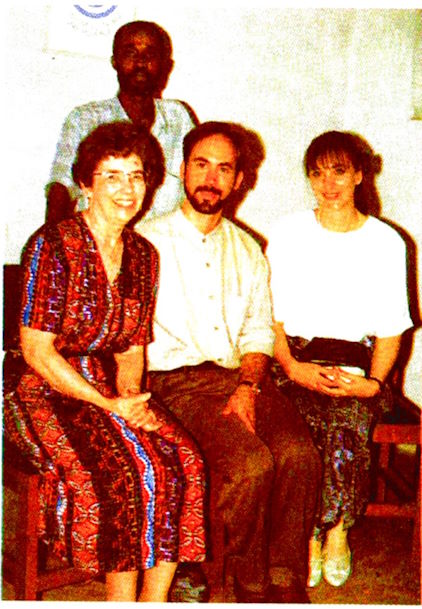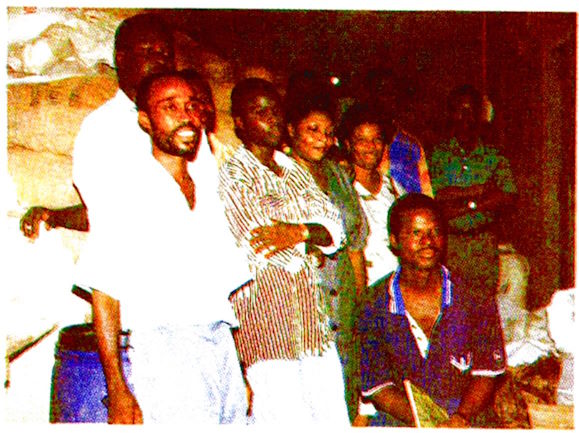© 1996 The Fellowship for readers of The Urantia Book

¶ An Invitation to Join Study in Ireland
It is with great empathy that I read Chilufya’s [Chilufya Thompson is International Editor of the Herald.] letter in the latest edition of the Study Group Herald. I lived for six years in London in the mid-80s, and was introduced to the big blue book by a long-time student, Gez Lamb. In London there is an active study group that meets on a regular basis, and attending the group was a great sustainer of my enthusiasm for the book.
I returned here to my native country in May 1990 and immediately set about trying to find those in this country who are readers of The UB. My search turned up three individuals, all of whom live a considerable distance from my home. The first lives in the northwest of the country and conversation with her revealed that she had read the book once, a long time ago, and that she was not at all interested in taking it up again.
The other two names were Jim and Lorraine Breffni, a couple who live in the north of the island. They were delighted to hear from me, and within three months we met and started the Irish Study Group. We only manage to meet about five times a year, but we greatly value these afternoons together. We tend to choose a paper per session and take turns reading aloud, and then we share our interpretations of what we have read. Sessions last about two hours.
We now have a fourth member in the group, my wife, Sabrina. I introduced her to the book during our courtship and she greatly enjoys coming to the meetings to pose difficult and stimulating questions to the group.
Like you, I would dearly love to have an active study group near where I live, which would be able to meet once a week. To this end I also have three copies of the book which I loan out to those who express an interest in it. So far, I have not succeeded in getting anyone interested enough that they want to join in our study sessions. Nevertheless, I am an optimist and I firmly believe that it is only a matter of time before we succeed in having a thriving study group here in Dublin.
Finally, I would like to extend an invitation to all readers of the book who read these words: If you are ever in Ireland on holidays, get in contact with me prior to your departure and I will convene a meeting to enable you to share your ideas on the book with us here in Ireland. I hope you all agree that it would be a great interchange of ideas and cultures. Looking forward to seeing you.
Adrian M. Joyce
15 Sandyford Hall Place
Kilgobbin Road,
Dublin 18 Ireland
Tel 353 1 295 0292
¶ A Bosnian Voice Rings Clear
By Nora Abdemoakher
In 1992 I found myself in Sweden, in cold Scandinavia. I had left Bosnia with relief, leaving behind the graveyard of the Balkans with its war and destruction. As I relaxed, I started to unpack my luggage.
I had left my home with one suitcase, but with much baggage. One was labeled fears, another labeled confusion, a third, who am I and what am I doing? I was lost in my prayers, with no clear idea to whom I was praying.
Then I went one evening to the Magasinet Depot, an old railway storage facility in Stockholm that served as a youth center. There I met Sandy and Christel Garrick, who were making preparations to start a choir.
“What will it be called?” I asked.
“POEGWAM,” answered Sandy, “an acronym for Peace On Earth and Good Will Among Men.”
I was skeptical, I must admit. I knew that there certainly was something more than things we could touch and see, but what was it all about? Psychology, maybe, or metaphysics; it never occurred to me that this other reality had to do with religion.
Religious affiliations were greatly discouraged in my country. In school I was taught that religion was an expression of fear, a refuge for weak, primitive reasoning that could not be rescinded, but was destined to extinction as humanity progressed. For the last couple of years, as religious institutions awakened in my country, they called people into war, in the name of “God and nation.”
Watching the Garricks, I realized that there was some unshakable foundation beyond their works, something different from what I have seen. Their acts were based on much love, reflection, understanding, patience, and compassion.
“What is religion?” I finally dared to ask.
“It is sharing your inner life with God,” replied Sandy.
This answer shook me to the root of my being.
The choir grew and we soon numbered 20, often more. There I met Saed Abdemoakher, an Iranian Kurd, whom I have married.
The Garricks, Saed, and I started studying The Urantia Book. They told only those who asked about the book. Many others never found out that some big blue book bolstered this act of love in our choir. But they learned of its principles. They sang cheerfully about love, kindness, compassion, and patience.
We prayed together a lot and we did it with humor and from the bottom of our hearts. The Garricks always reminded us to thank God for his fragment that lives within us, that leads us and draws us closer to him.
The rehearsals were something we all looked forward to. These gatherings enriched our lives, drawing all the best from our personal experience and beliefs, different cultural backgrounds, and faiths.
“The name of the Father,” said one of the songs from our repertoire. “What’s the difference if you call the name of the Father Allah, Buddha, Elohim, Yehova, all the same loving Father.”
We sang in churches, senior centers, and hospitals.
My subsequent study of The Urantia Book didn’t take away my negative baggage, but it made it easier for me to sort through, for I knew I wasn’t alone. It answered many of my questions as well as giving rise to new questions. It opened horizons I never dreamed of.
I believe in movements such as POEGWAM, as I see how positively this choir touched the lives of all who joined it. As Sandy said, “This is the message that doesn’t argue with any religion or creed, rather adheres to what has united the prophetic thought of all ages. Peace On Earth and Good Will Among Man could (should) turn out to be the saving grace of all mankind through the universal language of music.”

And now, as I am writing this, I have received news that Sandy Garrick has departed to the mansion worlds. I can’t believe it. I see him sitting at the kitchen table, cigarette in hand, The Urantia Book in front of him, laughing. “Daughter,” he called me when we first met and always after. As a refugee myself, I have found Sandy as living proof that one can, in spite of everything, come out of genocide with optimism, love, and faith.
Born in Hungary, under the threat of Jewish holocaust, as a 13-year-old, he embarked on a NATO ship and escaped to Canada. He lived in a dozen countries over the world, including the United States, Sweden, England, Germany, Australia, and Japan. As a professional musician, he conducted orchestra, played and re- corded music, and together with his loving wife and children, lived a life in friendship and love.
His approach to the divine was through music and humor. The minister in one of the churches where Sandy conducted a gospel choir said, “What I have learned from Sandy was to laugh, to take God and religion easily, with humor and song.”
On his last day, Sandy died without pain, with a big hamburger and Coke in his hands, and with a complaint that they weren’t as good as those in New York, as he thought nothing in Sweden to be as good as in the United States. “I have lived a most charming life” were his last words. te
Nora Abdemoakher now resides in Berkeley, California, and has begun translating The Urantia Book into Serbo-Croation, to make “its precious teaching available to family and friends.” This project is being sponsored by the Golden Gate Circle Society.
¶ Activities in Ghana
By Dr. R. A. Quaynor
We are happy here together as a group and meet on Sunday evenings for teachings into the deeper mysteries.
We recently organized a convention on a small scale and were privileged to have our brothers and sisters come all the way from America to grace the occasion with lectures.
We operate a Clinical Service Programme, located in various regions throughout Ghana. Accra is the headquarters, of course, and there are two other centers in Cape Coast in the central region and Takeradi in the western region. We go by the name Agrata Natural Healing and Radionic Centre, producing natural herbal medicine in our laboratory and factory.
In the years to come it is our intention to establish contact with all Urantia groups throughout the world, and we hope that our relationship shall be cemented to promote the spread of the Urantia teachings.
Dr. R. A. Quaynor is a member of Urantia Nazareth Brotherhood and may be contacted at P.O. Box 4291, Accra, Ghana. (Telephone: Cape Coast 042-32875, Accra 021-232130, fax number 042-32644).

